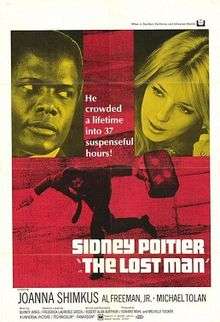The Lost Man
The Lost Man is a 1969 American crime film, written and directed by Robert Alan Aurthur, loosely based on British author F.L. Green's novel Odd Man Out, which was previously made into a 1947 film directed by Carol Reed and starring James Mason.
| The Lost Man | |
|---|---|
 | |
| Directed by | Robert Alan Aurthur |
| Produced by | Edward Muhl Melville Tucker |
| Screenplay by | Robert Alan Aurthur |
| Based on | Odd Man Out by F.L. Green |
| Starring | Sidney Poitier Joanna Shimkus |
| Music by | Quincy Jones |
| Cinematography | Gerald Perry Finnerman |
| Edited by | Edward Mann |
Production company | Universal Pictures |
| Distributed by | Universal Pictures |
Release date |
|
Running time | 122 minutes |
| Country | United States |
| Language | English |
| Box office | $1.85 million (US/ Canada rentals)[1] |
Plot
Former US Army lieutenant Jason Higgs (Sidney Poitier), after becoming a black militant during the 1960s Black Revolutionary Movement, is wounded as he pulls a payroll heist to help imprisoned brothers, and has to hide from the police. Social worker Cathy Ellis (Joanna Shimkus) falls in love with Higgs while helping him elude capture.
Cast
- Sidney Poitier as Jason Higgs
- Joanna Shimkus as Cathy Ellis
- Al Freeman Jr. as Dennis Lawrence
- Michael Tolan as Inspector Hamilton
- Richard Dysart as Bernie
- David Steinberg as Photographer
- Paul Winfield as Orville Turner
- Beverly Todd as Sally Carter/Dorothy Starr
- Vonetta McGee as Diane Lawrence
- Frank Marth as Warren
Critical Response
The New York Times gave the film a lukewarm review upon its release,[2] though a review by Roger Ebert was more positive, albeit with reservations.[3]
Production
Poitier met his second wife, Joanna Shimkus, during the making of this movie.
Musical score and soundtrack
| The Lost Man | ||||
|---|---|---|---|---|
.jpg) | ||||
| Soundtrack album by | ||||
| Released | 1969 | |||
| Recorded | 1969 | |||
| Genre | Film score | |||
| Length | 33:54 | |||
| Label | Uni UNI 73060 | |||
| Producer | Quincy Jones, Stanley Wilson | |||
| Quincy Jones chronology | ||||
| ||||
The film score was composed by Quincy Jones and conducted by Stanley Wilson, and the soundtrack album was released on the Uni label in 1969.[4][5]
Reception
| Review scores | |
|---|---|
| Source | Rating |
| Allmusic | |
Allmusic's Brandon Burke said the soundtrack had "In the strict sense of the word, The Lost Man was not a blaxploitation film, but its soundtrack (arranged by Quincy Jones) might lead you to think otherwise. ... Jones takes the sparse, groove-oriented route heard on the J.J. Johnson scores for Cleopatra Jones and Across 110th Street. This is most evident on downtempo numbers like the sultry "Sweet Soul Sister" (featuring Nate Turner & the Mirettes) and the opening theme. "Main Squeeze," however, is a funk bomb if ever there was one and, thankfully, its bass-driven motif runs throughout the LP. Recommended if you can find it".[6]
Track listing
All compositions by Quincy Jones except where noted
- "The Lost Man (Main Title)" (Lyrics by Dick Cooper, Ernie Shelby) − 2:35
- "Sweet Soul Sister" (Lyrics by Cooper, Shelby) − 2:48
- "Slum Creeper" − 3:22
- "Rap, Run It on Down" (Lyrics by Cooper, Shelby) − 2:31
- "He Says He Loves Me" (Lyrics by Diane Hilderbrand, Cooper, Shelby) − 3:45
- "Main Squeeze" − 2:48
- "Try, Try, Try" (Lyrics by Cooper, Shelby) − 2:46
- "Need to Be Needed" − 4:46
- "Up Against the Wall" − 4:20
- "He'll Wash You Whiter than Snow" (Cora Martin) − 2:15
- "End Title" − 1:58
Personnel
- Unidentified orchestra arranged by Quincy Jones and conducted by Stanley Wilson including:
- Ernestine Anderson (track 5), The Church Choir (track 10), Venetta Fields (tracks 4 & 7), Geraldine Jones (track 11), The kids from PASLA (track 1), The Mirettes (tracks 2, 4 & 7), The Pree Sisters (track 5), Nate Turner (tracks 2 & 4) − vocals
- Ray Brown − bass (track 11)
- Arthur Adams − guitar (track 11)
See also
References
- "Big Rental Films of 1969", Variety, 7 January 1970 p 15
- Canby, Vincent (June 26, 1969). "The Lost Man (1969) 'The Lost Man' Opens Here:Poitier in Lead Role as a Black Militant Four Other Films Also Start Local Runs". The New York Times.
- Ebert, Roger (June 27, 1969). "The Lost Man (1969)".
- Soundtrack Collector: album entry accessed January 29, 2018
- Edwards, D., Eyries, P. & Callahan, M. Universal City Records [UNI] Album Discography, accessed January 29, 2018
- Burke, Brandon. The Lost Man (Original Soundtrack) – Review at AllMusic. Retrieved January 29, 2018.
External links
- The Lost Man on IMDb
- The Lost Man at the TCM Movie Database
- The Lost Man at AllMovie